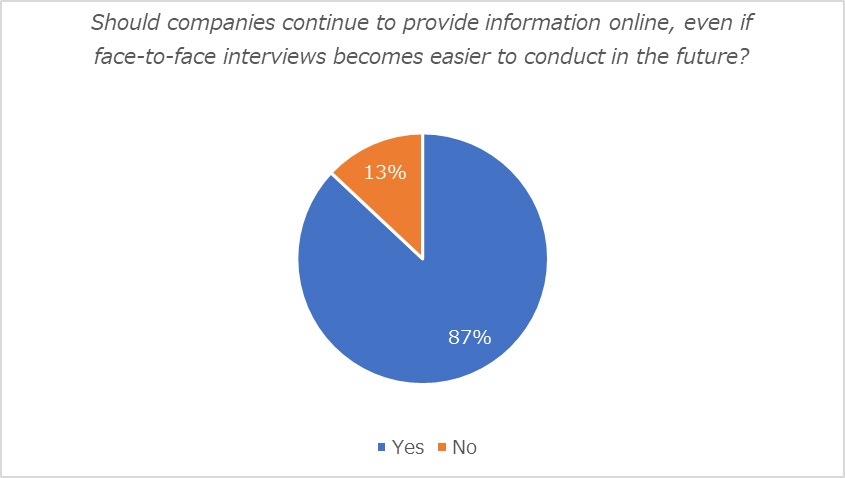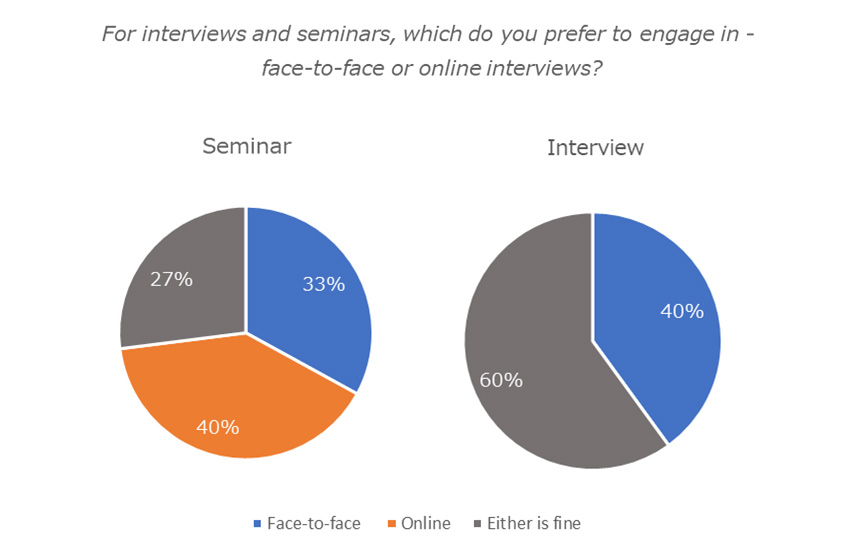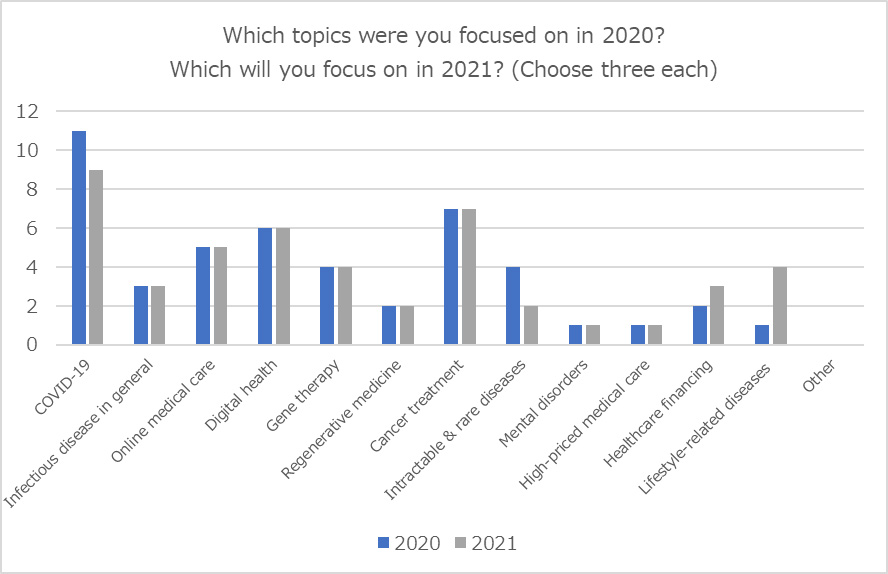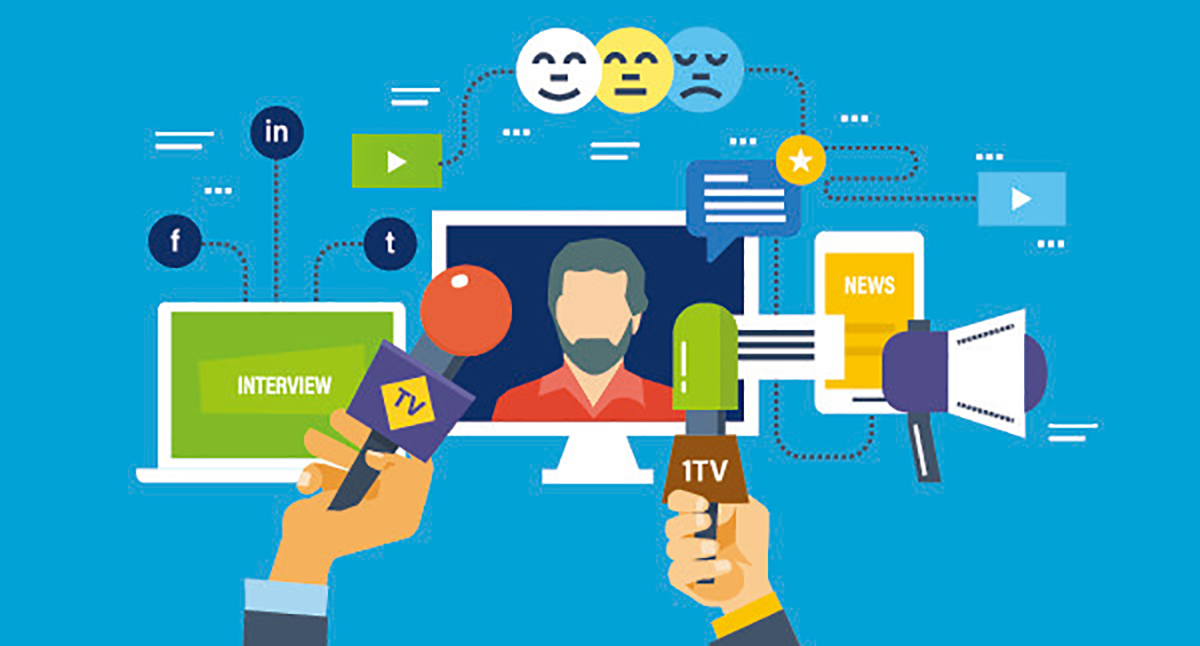Journalists in Japan embrace online interviews and want them to continue post-COVID-19, in combination with face-to-face PR to accelerate information sharing.
Drastic changes in the ways in which companies share information with the media in Japan have been accelerated by the COVID-19 pandemic. While delivering information online has undoubtedly seen a rapid rise over the past 12 months, there are still some who argue that such channels leave a gap when it comes to giving media what they want.
COSMO decided to find out. We carried out a media survey of fifteen of our closest front-line reporters from the healthcare sector* on “How corporate PR should provide information to the media during the COVID-19 pandemic.”
Conducted from 21 to 23 December, 2020, the results offer first-hand insights into which approaches media find the most suitable, and the topics reporters most want to hear more about.
Read on for a summary of key findings and insights that will help you successfully navigate your corporate PR in 2021 and beyond.
■Online interviews became mainstream due to the pandemic
The survey began by asking media how they gained information from companies after Japan’s first state of emergency was declared in April 2020. More than 90% responded with either “entirely conducted online” or “mostly conducted online” for media seminars, and 80% responded likewise for interviews. The majority of companies switched from face-to-face to online information sharing as a direct response to the first state of emergency to prevent the spread of infection.
With doctor and patient interviews so critical to healthcare reporting, how were these affected? For doctor interviews, 9 out of 10 applicable media responded that “since face-to-face interviews became difficult, we have switched to online interviews.” This number fell for patient interviews, with 3 out of 7 applicable media responding “we were unable to interview at all,” and the remaining 4 responding “since face-to-face interviews became difficult, we have mainly held interviews online.” In both cases the difficulty in holding face-to-face interviews resulted in a major move to online alternatives.
Asked what positives can be drawn from this change, varied responses included “reduced travel time” (87%), “more interviews can be conducted” (67%), and “writing articles becomes more efficient” (27%). Other responses included “could ask questions easily” and “could attend seminars in distant locations.”
The most commonly cited negative points were “unable to exchange business cards” (60%), “unable to [physically] approach interviewee for quick additional questions” (60%), “unable to take photos” (53%), “difficult to ask questions” (47%), and “sometimes the connection is unstable” (40%).
Looking to brighter days ahead, respondents were asked whether companies should continue to provide information online even if face-to-face interviews become easier. 13 out of 15 media (87%) are in favor of companies doing so. The main reasons cited were “more efficient,” “reduced travel time,” and “increased scope of feasible coverage.”
While there remain elements of face-to-face interactions that can’t be replicated online, it is clear that the widespread adoption of online media relations in response to the first state of emergency has enabled media in Japan to fully appreciate the advantages of online information sharing.

■Online and in-person, the dawn of a hybrid future
When asked if they prefer face-to-face or online interviews for interviews and seminars, 40% prefer “face-to-face” for interviews, because “it is easier to understand the other person’s situation,” “I can grasp the other person’s facial expressions and tone of voice,” and “I can ensure the contact is more likely to remember my face.” However, 60% responded that “either is fine.”
For seminars, 33% prefer “face-to-face,” because “it is easy to understand the reaction of the presenter and participants” and “easy to ask questions and conduct additional interviews,” while 40% prefer online because it is “not inconvenient, except for being unable to exchange business cards,” while 27% responded “either is fine.”
Many media prefer face-to-face for interviews, but online for seminars. That said, a significant number feel “either is fine” for both interviews and seminars. When asked why, responses varied from “I would like to choose according to my needs” and “I would like to take advantage of the strong points of each,” to “it depends on the time, place, and subject of the interview” and “if I want to write an article, I prefer face-to-face, but if I just want to listen, I prefer online.”
So rather than simply “either is fine”, we can conclude that media really want choice and to be able to select the best option for each opportunity. Even in a post- COVID-19 world, corporate PR efforts cannot afford to simply return to face-to-face interviews. Companies will be expected to meet this changing media demand by offering a range of options that continues to include online access to spokespersons.

■Timing counts when it comes to online seminars
Results revealed some key findings when taking a closer look at media’s practical preferences for online seminars:
- Afternoons are better. 2 – 4 p.m. is the most preferred time for holding an online seminar (33%), followed by 12 – 2 p.m. and 4 – 6 p.m. (20% each).
- One hour is the most preferred length (73%), followed by 90 minutes (20%).
- “Web chat (comments hidden, viewable only to organizer)” is the most preferred Q&A format at 53%, followed by “option to ask questions directly over microphone” at 40%.
- Handouts provided “by email one day beforehand” is the most preferred timing for receiving accompanying information (47%).
- Other materials considered helpful include “photos of the speaker” (60%), “video recording of the seminar” (47%), “transcript of speaker’s remarks” (40%), and “speaker bio” (27%).
■“COVID-19”, “cancer”, and “digital health” remain key trends for 2021
The survey closed by asking media to select three healthcare topics they focused on in 2020, and three that they expect to focus on in 2021. Topics related to COVID-19 (including drugs and vaccines) were naturally at the top of the list, but wider deregulation due to the pandemic has sparked a high level of interest in online medical care and digital health, which are expected to expand rapidly in Japan in the future.
Results also revealed that interest in cancer treatment remains high, as well as topics including gene therapy, regenerative medicine, intractable and rare diseases, and lifestyle-related diseases (diabetes, hypertension), within the context of a post-COVID-19 era.

As PR professionals we must continue to monitor the media’s changing areas of interest and be ready to respond accordingly, while at the same time continuing to seek innovative ways to provide detailed information through proactive communication with journalists. We hope that the findings summarized in this newsletter will help you join us in rising to this challenge.
[Survey overview]
Title: “Questionnaire on how corporate PR should provide Information to the media during the COVID-19 pandemic”
Date: December 21, 2020 (Monday) – December 23, 2020 (Wednesday)
Methodology: Online survey
Target pool: 15 reporters from the healthcare field*
*Survey respondents: 4 national dailies, 1 news agency, 1 trade newspaper, 3 specialist media for medical professionals, 1 general magazine, 1 TV, 8 online media (some respondents have more than one media affiliation).
Note: This newsletter is based on results from a survey conducted independently by COSMO. If you have any questions about the survey, please contact us at CBS@cosmopr.co.jp
******************************************

We would like to express our sincere gratitude to all for your support this year.
At COSMO HEALTHCARE, we will continue to work to improve healthcare by addressing issues through public relations and communication.
We look forward to your continued guidance, encouragement, and patronage in 2021.
P.S. Our office will be closed for winter vacation from December 28 through January 4. We will be open for business from January 5.
Thank you for your cooperation.






